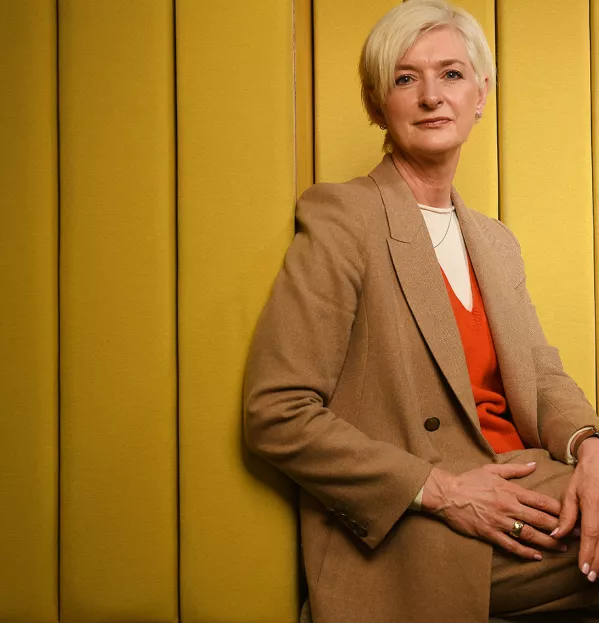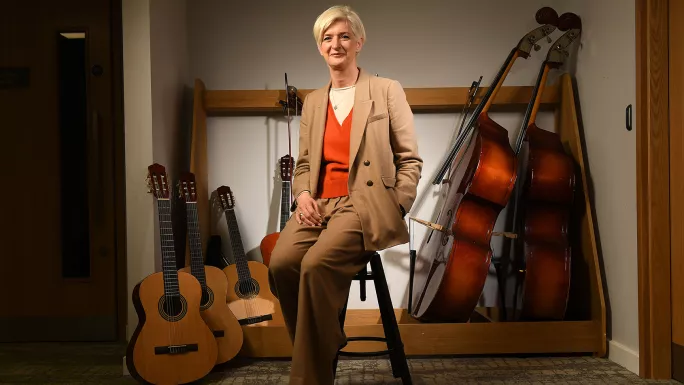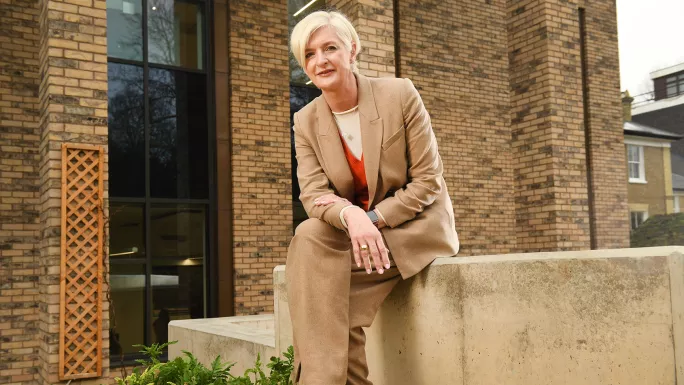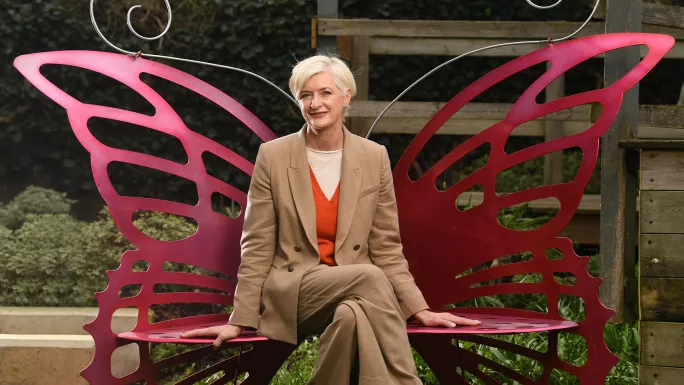- Home
- Leadership
- Strategy
- 10 questions with...GDST CEO Cheryl Giovannoni
10 questions with...GDST CEO Cheryl Giovannoni

Cheryl Giovannoni is the CEO of the Girls’ Day School Trust (GDST), a charity that owns and runs a network of 25 schools in England and Wales, including 23 independent schools and two academies.
GDST can trace its roots back to 1872 when it was formed by four women who wanted girls to have the same access to education as boys.
Giovannoni joined the GDST in 2016 having spent the entirety of her career prior to the role working at advertising giant WPP Group, including time as the CEO of boutique design agency Coley Porter Bell.
She chatted to Tes about what led her to switch from advertising to education, her own time in school growing up in apartheid-era South Africa and the importance she places on giving girls an education that takes into account their hopes, dreams and aspirations.
1. Who was your most memorable teacher at school and why?
I had this incredible English teacher called Mrs Knowles and she was this really cool, fabulous woman who we all thought was a bit of a rock star.
She once said to me - she was talking about what she thought each of us would end up doing in our careers - and I always remember she said, “Oh, Cheryl, I think you’re going to be the editor of Vogue.”
I just absolutely loved that. She was an amazing, inspiring woman.
2. Were you a good student?
I loved school. I was incredibly competitive. I was very much a model student - I was hard-working and I did all the right things.
I have a sister who is 14 months older than me and I always wanted to be better than she was - I think that made me a total nightmare of a younger sibling. But I think she drove my ambition to be learning as much as she was and to do everything she could and try to do it better.
3. What were the best and worst things about your time at school?
I went to school in Johannesburg in South Africa and I always felt I had a very privileged upbringing - I grew up during the apartheid years when there wasn’t free education for all children in South Africa.
So it almost didn’t matter which school you were in because you were an incredibly privileged human being if you were even being given an education, and I was always very conscious of that growing up.
I remember once having a conversation with my mother about the woman who worked in our home, and I didn’t understand why her children were not allowed to go to school with us. And that was always quite a difficult conversation to be having in South Africa because it was so political at that point - it was essentially being brought up in a police state.
4. Why do you work in education?
I suppose it’s a slightly different question for me because I think about why I work in girls’ education and that to me is what is so important about the job I do now, and why I was attracted to it in the first place.
I come from an advertising background, I spent my whole career in WPP in marketing and advertising, and communication, which is very different.

But throughout my career, I was always incredibly committed to being a strong mentor for other females and really trying to help women realise their potential.
I was never intending to work in education necessarily but I have two daughters, so I was certainly interested in education and in how girls were being educated. Then this job came up and I looked at it and there was so much I felt I could do in terms of the agenda around girls’ empowerment and girls’ education, and that really spoke to me.
I thought if I could try to have a role in helping shape the future of girls’ education, that felt like a really important job to be done.
5. What are you proudest of in your career?
I feel really proud that we are driving a conversation about the future of female leaders.
We launched a report called The Girls’ Futures Report, and there are all kinds of interesting insights into what girls’ dreams and aspirations are for the future. What are they hoping their careers will look like? What are they most worried about? What inspires them?
One of the findings from the research was that very few girls believe they have a sound financial education during school - they don’t feel like they understand finances very well.
I took that problem to a meeting I had last week with Women in Finance - an organisation that has been formed by all the major financial institutions in the country, trying to drive an agenda around gender equality and trying to improve the number of women in the finance industry.
They’ve invited me to sit on their advisory panel to work out how we start even younger and I presented at their conference [on the issue above]. They absolutely supported the notion that there’s something we could do for girls in schools, including building a program around learning about finances from ages 3-18.
They are going to help sponsor it and support it to help make it happen. The ambition I have for it is that it could eventually become a global program around finance education for girls specifically, so we could make a difference on this all around the world.
6. Do you have any regrets?
I suppose my regret is I didn’t come to this sooner - not necessarily this job - but I feel like I can make such a difference and there is a huge job to be done and I wish my whole career had been about that.
So I often I say to the girls in our schools: “Find something you absolutely love that you want to do and that is going to give you that purpose and satisfaction.” That matters almost more than anything else.
7. What are the best and worst aspects of our school system?
I think the lack of consistency and continuity makes it a very uncertain world to be navigating right now and I think it’s really unhelpful.
If I could have my way, I would take education out of the political situation, and almost have it sit above politics, so there was some real commitment to the long-term sustainability of an education system - there have been too many changes and there is no stability in what the long-term future looks like.

As a result, I think there’s a lack of innovation and a lack of really focusing on what is truly needed.
I think the best aspect happened during Covid, actually - the collaboration and the work to try to get children an education through what was such an incredibly difficult period, and the sort of collaboration that happened across sectors, and people forgetting about [the concept of] independent and state [schools] and working in a way that was totally collaborative and supportive as much as we possibly could.
I think there was a real opportunity - that we shouldn’t lose - to ask how we could work together more effectively in this country, rather than being so divisive.
8. Your own teachers aside, who in education has influenced you the most?
What inspires me the most is the girls in our schools. I look at them and I am totally inspired by their energy and attitude towards the future and the kind of role they think they’re going to play in the future.
9. If you became education secretary tomorrow, what would be the first thing you would do?
I have a huge amount of empathy for the work around early years education that is going on right now, which I think is exactly the right place to put the energy and the momentum.
I think the younger you start, the better the chances of giving children an education that will serve them really well in the future. And anything we could do around the kind of system to support the possibility of that happening is the right place to start.
The other thing I would do is I’d probably scrap GCSEs and think much harder about what is the best way to evaluate learning that doesn’t involve so much focus being put on the kind of very stressful, single exams that are really high-stakes and not necessarily the best way of educating pupils.

Finally, the other thing I would do, because I come from a country where we did six subjects at our equivalent of A levels, would be to introduce a kind of international baccalaureate (IB) model across all schools.
I think it gets too narrow far too quickly - I think doing three, maybe four subjects at A level is very narrow and I think it restricts [pupils], especially when you think about what the future looks like. Restricting students to three very specialist subjects so early on is a mistake.
10. What are the most important lessons you’ve learned doing this job?
I have a very optimistic outlook and I always believe things are going to be OK in the end - and they generally are. I think it is a profession that has so much positivity and that works to empower the next generation. We need to remember that and not be too swept up by the business side of things.
At the end of the day, we are doing a job that is about really educating and helping set students up for their futures - and we should never underestimate that.
You need a Tes subscription to read this article
Subscribe now to read this article and get other subscriber-only content:
- Unlimited access to all Tes magazine content
- Exclusive subscriber-only stories
- Award-winning email newsletters
Already a subscriber? Log in
You need a subscription to read this article
Subscribe now to read this article and get other subscriber-only content, including:
- Unlimited access to all Tes magazine content
- Exclusive subscriber-only stories
- Award-winning email newsletters



